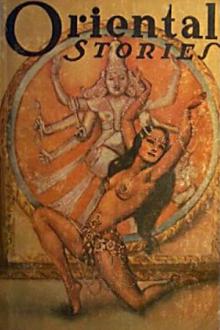Lord of Samarcand, Robert E. Howard [novel24 .TXT] 📗

- Author: Robert E. Howard
- Performer: -
Book online «Lord of Samarcand, Robert E. Howard [novel24 .TXT] 📗». Author Robert E. Howard
But a wounded man babbled of a Highland plaid, before he died, and an ax wielded by no English hand. Men came to Donald and questioned him hardly, but he snarled at them like a wolf, and the king, after piously burning many candles for Douglas’ soul in public, and thanking God for the baron’s demise in the privacy of his chamber, announced that “we have heard of this persecution of a loyal subject and it being plain in our mind that this youth is innocent as ourselves in this matter we hereby warn all men against further hounding of him at pain of death.”
So the king’s protection saved Donald’s life, but men muttered in their teeth and ostracized him. Sullen and embittered, he withdrew to himself and brooded in a hut alone, till one night there came news of the king’s sudden abdication and retirement into a monastery. The stress of a monarch’s life in those stormy times was too much for the monkish sovereign. Close on the heels of the news came men with drawn daggers to Donald’s hut, but they found the cage empty. The hawk had flown, and though they followed his trail with reddened spurs, they found only a steed that had fallen dead at the seashore, and saw only a white sail dwindling in the growing dawn.
Donald went to the Continent because, with the Lowlands barred to him, there was nowhere else to go; in the Highlands he had too many blood-feuds; and across the border the English had already made a noose for him. That was in 1389. Seven years of fighting and intriguing in European wars and plots. And when Constantinople cried out before the irresistible onslaught of Bayazid, and men pawned their lands to launch a new Crusade, the Highland swordsman had joined the tide that swept eastward to its doom. Seven years—and a far cry from the border marches to the blue-domed palaces of fabulous Samarcand, reclining on a silken divan as he listened to the measured words which flowed in a tranquil monotone from the lips of the lord of Tatary.
“If thou’rt the lord of this castle.
Sae well it pleases me:
For, ere I cross the border fells.
The tane of us shall dee.”
—Battle of Otterbourne.
Time flowed on as it does whether men live or die. The bodies rotted on the plains of Nicopolis, and Bayazid, drunk with power, trampled the scepters of the world. The Greeks, the Serbs and the Hungarians he ground beneath his iron legions, and into his spreading empire he molded the captive races. He laved his limbs in wild debauchery, the frenzy of which astounded even his tough vassals. The women of the world flowed whimpering between his iron fingers and he hammered the golden crowns of kings to shoe his war-steed. Constantinople reeled beneath his strokes, and Europe licked her wounds like a crippled wolf, held at bay on the defensive. Somewhere in the misty mazes of the East moved his arch-foe Timour, and to him Bayazid sent missives of threat and mockery. No response was forthcoming, but word came along the caravans of a mighty marching and a great war in the south; of the plumed helmets of India scattered and flying before the Tatar spears. Little heed gave Bayazid; India was little more real to him than it was to the Pope of Rome. His eyes were turned westward toward the Caphar cities. “I will harrow Frankistan with steel and flame,” he said. “Their sultans shall draw my chariots and the bats lair in the palaces of the infidels.”
Then in the early spring of 1402 there came to him, in an inner court of his pleasure-palace at Brusa, where he lolled guzzling the forbidden wine and watching the antics of naked dancing girls, certain of his emirs, bringing a tall Frank whose grim scarred visage was darkened by the suns of far deserts.
“This Caphar dog rode into the camp of the janizaries as a madman rides, on a foam-covered steed,” said they, “saying he sought Bayazid. Shall we flay him before thee, or tear him between wild horses?”
“Dog,” said the Sultan, drinking deeply and setting down the goblet with a satisfied sigh, “you have found Bayazid. Speak, ere I set you howling on a stake.”
“Is this fit welcome for one who has ridden far to serve you?” retorted the Frank in a harsh unshaken voice. “I am Donald MacDeesa and among your janizaries there is no man who can stand up against me in sword-play, and among your barrel-bellied wrestlers there is no man whose back I can not break.”
The Sultan tugged his black beard and grinned.
“Would thou wert not an infidel,” said he, “for I love a man with a bold tongue. Speak on, oh Rustum! What other accomplishments are thine, mirror of modesty?”
The Highlander grinned like a wolf.
“I can break the back of a Tatar and roll the head of a Khan in the dust.”
Bayazid stiffened, subtly changing, his giant frame charged with dynamic power and menace; for behind all his roistering and bellowing conceit was the keenest brain west of the Oxus.
“What folly is this?” he rumbled. “What means this riddle?”
“I speak no riddle,” snapped the Gael. “I have no more love for you than you for me. But more I hate Timour-il-leng who has cast dung in my face.”
“You come to me from that half-pagan dog?”
“Aye. I was his man. I rode beside him and cut down his foes. I climbed city walls in the teeth of the arrows and broke the ranks of mailed spearmen. And when the honors and gifts were distributed among the emirs, what was given me? The gall of mockery and the wormwood of insult. ‘Ask thy dog-sultans of Frankistan for gifts, Caphar,’ said Timour—may the worms devour him—and the emirs roared with laughter. As God is my witness, I will wipe out that laughter in the crash of falling walls and the roar of flames!”
Donald’s menacing voice reverberated through the chamber and his eyes were cold and cruel. Bayazid pulled his beard for a space and said, “And you come to me for vengeance? Shall I war against the Lame One because of the spite of a wandering Caphar vagabond?”
“You will war against him, or he against you,” answered MacDeesa. “When Timour wrote asking that you lend no aid to his foes, Kara Yussef the Turkoman, and Ahmed, Sultan of Bagdad, you answered him with words not to be borne, and sent horsemen to stiffen their ranks against him. Now the Turkomans are broken, Bagdad has been looted and Damascus lies in smoking ruins. Timour has broken your allies and he will not forget the despite you put upon him.”
“Close have you been to the Lame One to know all this,” muttered Bayazid, his glittering eyes narrowing with suspicion. “Why should I trust a Frank? By Allah, I deal with them by the sword! As I dealt with those fools at Nicopolis!”
A fierce uncontrollable flame leaped up for a fleeting instant in the Highlander’s eyes, but the dark face showed no sign of emotion.
“Know this, Turk,” he answered with an oath, “I can show you how to break Timour’s back.”
“Dog!” roared the Sultan, his gray eyes blazing, “think you I need the aid of a nameless rogue to conquer the Tatar?”
Donald laughed in his face, a hard mirthless laugh that was not pleasant.
“Timour will crack you like a walnut,” said he deliberately. “Have you seen the Tatars in war array? Have you seen their arrows darkening the sky as they loosed, a hundred thousand as one? Have you seen their horsemen flying before the wind as they charged home and the desert shook beneath their hoofs? Have you seen the array of their elephants, with towers on their backs, whence archers send shafts in black clouds and the fire that burns flesh and leather alike pours forth?”
“All this I have heard,” answered the Sultan, not particularly impressed.
“But you have not seen,” returned the Highlander; he drew back his tunic sleeve and displayed a scar on his iron-thewed arm. “An Indian tulwar kissed me there, before Delhi. I rode with the emirs when the whole world seemed to shake with the thunder of combat. I saw Timour trick the Sultan of Hindustan and draw him from the lofty walls as a serpent is drawn from its lair. By God, the plumed Rajputs fell like ripened grain before us!
“Of Delhi Timour left a pile of deserted ruins, and without the broken walls he built a pyramid of a hundred thousand skulls. You would say I lied were I to tell you how many days the Khyber Pass was thronged with the glittering hosts of warriors and captives returning along the road to Samarcand. The mountains shook with their tread and the wild Afghans came down in hordes to place their heads beneath Timour’s heel—as he will grind thy head underfoot, Bayazid!”
“This to me, dog?” yelled the Sultan. “I will fry you in oil!”
“Aye, prove your power over Timour by slaying the dog he mocked,” answered MacDeesa bitterly. “You kings are all alike in fear and folly.”
Bayazid gaped at him. “By Allah!” he said, “thou’rt mad to speak thus to the Thunderer. Bide in my court until I learn whether thou be rogue, fool, or madman. If spy, not in a day or three days will I slay thee, but for a full week shalt thou howl for death.”
So Donald abode in the court of the Thunderer, under suspicion, and soon there came a brief but peremptory note from Timour, asking that “the thief of a Christian who hath taken refuge in the Ottoman court” be given up for just punishment. Whereat Bayazid, scenting an opportunity to further insult his rival, twisted his black beard gleefully between his fingers and grinned like a hyena as he dictated a reply, “Know, thou crippled dog, that the Osmanli are not in the habit of conceding to the insolent demands of pagan foes. Be at ease while thou mayest, oh lame dog, for soon I will take thy kingdom for an offal-heap and thy favorite wives for my concubines.”
No further missives came from Timour. Bayazid drew Donald into wild revels, plied him with strong drink and even as he roared and roistered, he keenly watched the Highlander. But even his suspicions grew blunter when at his drunkest Donald spoke no word that might hint he was other than he seemed. He breathed the name of Timour only with curses. Bayazid discounted the value of his aid against the Tatars, but contemplated putting him to use, as Ottoman sultans always employed foreigners for confidants and guardsmen, knowing their own race too well. Under close, subtle scrutiny the Gael indifferently moved, drinking all but the Sultan onto the floor in the wild drinking-bouts and bearing himself with a reckless valor that earned the respect of the hard-bitten Turks, in forays against the Byzantines.
Playing Genoese against Venetian, Bayazid lay about the walls of Constantinople. His preparations were made: Constantinople, and after that, Europe; the fate of Christendom wavered in the balance, there before the walls of the ancient city of the East. And the wretched Greeks, worn and starved, had already drawn up a capitulation, when word came flying out of the East, a dusty, bloodstained courier on a staggering horse. Out





Comments (0)